- Home
- Sarah Dessen
The Rest of the Story Page 3
The Rest of the Story Read online
Page 3
“Which was the same place.”
“But it sounded like a different one,” he said. “So the rich folks came and bought houses and joined the country club. And from then on, there were two towns. And one lake, that sounded like two, between them.”
Still not a single car had passed or come up behind us at the light. Despite different economies, neither town seemed to have much going on, at least at the current moment. “Let me guess,” I said. “When you came here with Nana in high school, you went left here, to Lake North.”
“Smart girl,” he replied. Then he put on his blinker, and we turned to the right.
It was a short trip. Four stoplights, to be exact, and then another turn onto a two-lane road, past a big sign with blue faded letters that said WELCOME TO NORTH LAKE: YOUR FAVORITE VACATION. Just past it, the motels began.
I lost count after six different establishments, each very similar in appearance. They were all one-story concrete buildings with grass driveways and parking lots, cars in diagonal spots lining the room doors. Most had an office, identified by a hand-lettered sign or an occasional one in neon proclaiming it as such, and many featured flower and rock gardens with yard art out in front. They had names like NORTH LAKE MOTOR INN and LIPSCOMB COURT and THE JACARANDA. Mixed in here and there were trailer parks, but not the kind with big double-wides. Instead, these were the small type you attached to a car and towed, some silver and stainless, others white or painted bright colors. There was so much to see, and all of it new, that even though we were going slowly, I couldn’t process much but a glimpse at a time before the scenery turned to something else.
In fact, I was looking ahead at two mini-golf courses that faced each other from opposite sides of the street—could an economy so small sustain this, I wondered?—when my dad slowed, turning into a drive on our right. It was another hotel, this one a single story of yellow painted concrete and bright blue doors, with a big scripted sign that said only CALVANDER’S. NO VACANCIES.
We pulled in, parking outside the office. As we climbed out of the car, I got my first glimpse of the water, blue and wide. Jutting out into it were a series of long wooden docks. On the one closest to us there were two porch swings hanging by chains, and in the quiet that followed the engine cutting off, I could distantly hear them clanking.
That was the first time I felt it, that twinge of recognition as something from my long-lost past reached out from my subconscious. Splinters, I thought as I looked at the docks again. But as quickly as the memory came, it was gone.
“Matthew? Is that you?”
A woman in shorts and a faded tie-dye T-shirt had come out of the office, the door in the process of shutting slowly behind her. She had white hair cut short, spiking up a bit at the top, and she was small in stature, but formidable in the way she carried herself, like she owned the place. Which, as it turned out, she did.
“Mimi,” my dad said, breaking into a wide smile. “How are you?”
“Better than a woman my age has any right to be,” she told him. As they embraced, I saw she really was very small, with tiny feet, like my mom’s. “You haven’t changed one bit. How is that?”
“Look who’s talking,” my dad said, stepping back to look at her and taking her hands. “You Calvanders, I swear. You don’t age.”
“Tell that to my hips and my knees.” Then she gave me a wink. “And this can’t be Saylor. Can it?”
I suddenly felt shy, and concealed myself a bit more behind the car.
“Emma,” my dad said, correcting my name kindly but clearly, “just turned seventeen. She’ll be a senior this year.”
“Unbelievable,” Mimi said. She looked at me for a minute. “Well, girl, come give your grandma a hug. Lord knows I’ve missed a few.”
I went, still feeling self-conscious as I approached her. As soon as I was close enough, she pulled me into her arms, her grasp surprisingly strong. I returned the hug, a bit less enthusiastically, while towering over her despite the fact that I am hardly a tall person.
After a moment, she released me, then stepped back to study my face, giving me a chance to look at her as well. Up close, I could see the effect of years of the dark tan she’d clearly cultivated in the leathery skin of her neck and face, as well as a penchant for gold braid jewelry (necklace, bracelet, knot earrings) that almost glowed against it. Most noteworthy, though, were her eyes, which were bright blue. Like mine, and my mom’s.
“I’m so glad you came, Saylor,” she told me, now squeezing both my arms. “It’s about time.”
“Emma and I,” my dad said, trying again, “are both really grateful you agreed to let her come visit. We know it’s literally last-minute.”
“Nonsense,” Mimi said. She winked at me again. “You’re family. And you’re not just coming. You’re coming back.”
A car drove by then, the first one other than our own we’d seen in ages. Actually, it was a truck, bright green, and when the driver beeped the horn as they passed, Mimi waved, not taking her eyes off me.
“Dad says I was here before, but I don’t really remember,” I told her, because it seemed like I should start at an honest place, considering. “When I was five?”
“Four,” she replied.
“I guess I’ll just have to take your word for it.”
“I’m good as my word, so I’d welcome that.” Then she turned back to the office door, pulling it open. “But just in case, come inside a second. I want to show you something.”
As I followed her, stepping over the threshold, the temperature dropped about twenty degrees, thanks to the window A/C unit blasting cold air from across the room. I felt like my teeth would start chattering within seconds and saw my dad wrap his arms around himself, but Mimi was unfazed as she walked to the wooden counter, which was covered with a sheet of glass.
“We’re almost out of room here, after so many summers,” she said, leaning over it. “I’m thinking I may have to expand onto a bulletin board or something soon. Not that anybody prints pictures anymore, though, with all this digital this and USB that. Anyway, let me see . . . I used to know right where it was. . . .”
I stepped up beside her. Under the glass, I saw, were what had to be hundreds of pictures, from old black and whites to dingy Polaroids to, finally, color snapshots. Across them all, as the faces and clothing changed, the scenery and backgrounds remained the same. There was the water, of course, and those long docks, the swings beneath them. The rock garden under the Calvander’s sign. And those yellow cinder blocks, broken up by blue doors. So many faces over so many years, both big group shots clearly taken for posterity and candids of people alone or in pairs. I leaned in closer, looking for my mom, the one face I might be able to pick out. But when Mimi found the snapshot she was looking for, tapping it with a long fingernail, all the people in it were strangers. Small ones.
“Now,” she said, gesturing for me to come closer, “this was the Fourth of July, I believe. Let’s see . . . there’s Trinity, on the far left, she would have been, what, nine? And next to her is Bailey, she’d be four then also, and Roo and Jacky, who despite the age difference might as well have been twins . . .”
I wanted to be polite, but was so cold I was losing feeling in my extremities.
“. . . and then there’s you.” She looked at me, then back at the picture. “Oh, I remember that cute bathing suit! You always did love giraffes. See?”
Me? I bent over the counter. Five little kids—three girls of varying ages and sizes, and two little towheaded boys—sat lined up on a wooden bench, the lake behind them. All held sparklers, although only a couple seemed to still be lit when the shutter clicked. The girl on the far left had on a bikini, her rounded, soft belly protruding; the younger one beside her, long blond hair and a one-piece with a tie-dye print. Then, the two boys, both in bathing suits, shirtless and white-blond, one of them squinting, as if the camera were the brightest of lights. And finally, me, in a brown suit with a green giraffe and the pigtails and home-cut bangs I
recognized from other shots of the same period. I was the only one who was smiling.
It was the weirdest feeling, so foreign and familiar all at once, seeing my own face in a place I didn’t recall. I knew the timeline, though. My parents’ marriage was crumbling due to my mom’s drinking and drug use, and by the coming winter, she would be in rehab and we’d move in with Nana. But sometime before all that, lost to my memory, was this trip. I’d clearly known these people well enough to be this comfortable and yet I’d still forgotten them.
“How long did I stay?” I asked Mimi.
“Two weeks, if I remember correctly,” she replied. “It was supposed to be one, but your mama got sick and plans changed.”
Sick, I thought, and only then did I remember my dad. I’d assumed he was listening to this. But he was standing facing the big glass window, looking out at the road, and appeared to be lost in thought.
“Where are all these people now?” I asked Mimi, who was rubbing the glass counter with the edge of her T-shirt, taking out some thumbprints on a low corner.
“Oh, they’re around,” she said. “You’ll see most of them, I’m sure, depending how long you’re here.”
“Three weeks at most,” my dad said now, having at some point tuned back to us. He sounded apologetic. “No change of plans this time, I promise.”
“You know I wouldn’t mind it,” Mimi said. “She can stay as long as she likes.”
There was a creak behind us: the door opening again. With it came a rush of warm, humid air, and an older man in khaki shorts and a golf shirt, a newspaper under his arm, walked in.
“There’s never been peace in that house in the morning, you’d think I’d—” He stopped talking when he saw me, then my dad, standing there. “Oh, sorry. Didn’t realize we had guests checking in.”
“They’re not,” Mimi said. “This is my granddaughter Saylor, Waverly’s girl. And Matthew, remember, I told you about him?”
The man smiled politely, sticking out a hand to my dad. “I’m sure you did. I’m Oxford.”
“My husband,” Mimi explained. When my dad looked at her, surprised, she said, “Joe died back in two thousand fifteen.”
“I’m sorry,” my dad said automatically. He looked shocked, and I realized again how strange it was he’d lost touch with her entirely. “God, Mimi. I had no idea.”
She waved her hand, batting his apology away. “Life gets busy when you’re raising kids. He had cancer and went quick, honey. And he went here, looking out at the lake, which is just what he wanted.”
We all stood there, taking a moment of silence for this person, whoever he was. Then Mimi looked at me. “Let’s get you over and settled, okay? Then we can send your dad on his way.”
I nodded, and she led us back outside. Oxford stayed behind, settling in an easy chair by the window with a sigh I could hear as he opened his paper.
“I can’t get over how much it looks the same,” my dad said as I went to the trunk to retrieve my suitcase and the small duffel I’d originally packed for Bridget’s. “But the dock’s new, or part of it, right?”
“Two years ago,” Mimi said, shading her eyes with one hand. “Hurricane Richard came through here and left nothing there but a pile of sticks. I cried when I saw it.”
“Really?” he asked. He looked at the dock again. “I figured this place was indestructible.”
“I wish,” she sighed. “A storm can change everything.”
“But you had insurance?”
“Thank goodness,” she said. “Joe always was one to prepare for the worst. So yes, we rebuilt. Luckily, the house and motel stood strong, although we lost a few trees and had flooding in some of the units. Nothing new carpet couldn’t fix, though.”
She started down the sidewalk that ran along the motel, and we fell in behind, first my dad, then me. There were seven units by my count, each with two plastic chairs parked outside, most of which were being used as drying racks for bathing suits or brightly colored towels. Every one had a window A/C unit going full strength as well.
A cleaning cart sat outside the last room, piled with folded towels, rolls of toilet paper, and little paper-wrapped soaps. I glanced inside: a dark-haired girl in shorts, quite pregnant, was wiping down a mirror. She glanced over as we passed before going back to what she was doing.
“We’re filled up this week, which is great for so early in the season,” Mimi was saying as we left the sidewalk and began across the grass to a nearby gray house with white trim. “The economy rules all, as Joe used to say, but most of our yearly bookings hung in even when everything went bust.”
“A lot of these motels and houses are rented by the same people for the same week, every single year,” my dad explained to me. “The reservations are handed down literally in wills, so they stay in the family. A lot of people have been coming here for generations.”
“And thank goodness for that,” Mimi added, starting up the front steps of the house, which had a wide porch, a couple of rocking chairs facing the water. “Joe used to say that it doesn’t matter what you do, everyone needs a vacation. In this business, we just happen to count on it.”
My dad followed her, taking the screen door she’d pulled open and holding it for me as she went inside. Once in the foyer, though, a cluttered living room to my right, I found myself stopping short. I was steps onto a shiny wooden floor that stretched down a long hallway before opening up to a wide room full of windows. Beyond them, there was only lake, the sun glittering off it.
“Emma?” my dad asked. “You okay?”
“Yeah,” I said. I wasn’t sure how to explain to him, or if I even could, how I knew that this floor would tilt up slightly as I walked across it, or that the room at the end of the hall was the kitchen, even though I could see nothing of it from where I stood. Outside, this house had felt new and unknown. But standing here now, I would have bet my life I’d walked down this same stretch many times before.
“Now, I’ve put you in the little bedroom, if that’s okay,” Mimi said over her shoulder as I finally moved forward, down the hallway to come into, yes, the kitchen. A big wooden table sat against the wall of windows facing the lake and everything smelled like toast. Also, the sink was stacked full of dirty dishes. Of course I noticed. “It’s the only one free and I knew you’d want your privacy. The sheets are all clean and there’s towels on the bed if you want to freshen up.”
“Thanks,” I said. “Is it . . .”
I trailed off as my dad climbed a nearby flight of stairs, carrying my suitcase with him, then went left on the landing. Clearly, he needed no directions.
“Right up there,” Mimi said to me. “You’ll find it.”
I thanked her, then went up the stairs myself, the middle one creaking audibly beneath me. At the top, the carpet was beige and well worn, and I could see there were three bedrooms to the left, a bathroom to the right. Only the door on the end was open, so I headed that way.
“You know your way around this place,” I said to my dad when I found him in a small bedroom with a single bed, a closet, and one window facing the lake.
“Spent some time here,” he replied, his voice low. I’d been so focused on my own memories, I hadn’t given much thought to what he’d been feeling. But it was definitely kicking up something. He’d put my suitcase in the closet, my duffel on the bed next to two stacked towels and a washcloth. They were white with a little pink rosebud pattern, and seeing them, I felt it again, that familiarity. “This was your mom’s room, way back when.”
“Really?” I walked around the end of the bed to look out the window. The roof below it slanted down at an angle, ending in what looked like a porch overhang. “She used to tell me stories about this.”
“This room?”
“And this view.” It was gorgeous, the pane of glass capturing the lake in a perfect frame. Straight out ahead I could see a floating platform, a motorboat tethered to it. To the right, there were the motels we’d passed, as well as more docks in fr
ont of small beaches where moss hung from the trees. And far to the left, what looked like a whole other town of large houses, hotels, and other newer construction. “And the boats. She talked about those, too.”
“Yes, I’m actually glad you brought that up while we were, um, alone.” He sat down on the bed. “I’d like a word with you about that.”
“About what?” I asked.
He nodded at the window, where another boat had now appeared, zooming past. “Boating. One of the great pastimes of North Lake. Which I enjoyed about as much as you do sailing.”
“Isn’t it the same thing?”
“No,” he said. “Sailing is about wind. With motorboats, it’s speed, which means it can be very dangerous, even if the driver of the boat hasn’t been drinking. And here, they often are.”
“You know I won’t drink, Dad,” I said.
“Yes,” he replied, “but I still want to say this. I don’t want you to ever go out on the water with someone who has been drinking or plans to.”
“Is this like a drug talk, but aquatic?”
“Emma.” That tone was like a yellow light, just before red: a warning. “Just promise me, please. It’s important.”
I looked out the window again. The boat had circled around and was now going back the other way. “I’ll be careful. I swear.”
“Okay.” He sat back, resting his palms on the nubby bedspread. “And you know, now that I think about it, this would be a great place to work on your driving. I’m sure Mimi has a car you could borrow.”
“Dad,” I said in my warning voice, “I’d rather talk about boats.”
“I know, I know.” He sighed. “And I’m trying to be understanding. But this is your driver’s license! When I was your age, I was counting the days until I could get on the road—”
“Because it represented freedom, and independence, all things already available to me via public transportation and ride apps,” I finished for him. “I don’t need to drive. It’s just not necessary.”
“But don’t you want to?” he asked.

 Just Listen
Just Listen Along for the Ride
Along for the Ride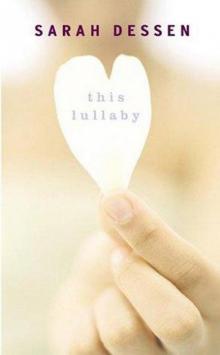 This Lullaby
This Lullaby Once and for All
Once and for All Lock and Key
Lock and Key The Truth About Forever
The Truth About Forever Someone Like You
Someone Like You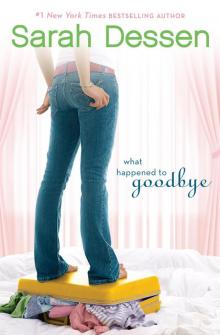 What Happened to Goodbye
What Happened to Goodbye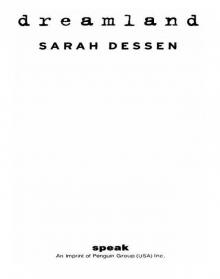 Dreamland
Dreamland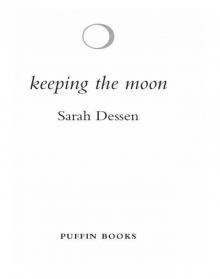 Keeping the Moon
Keeping the Moon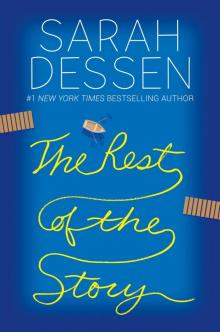 The Rest of the Story
The Rest of the Story The Moon and More
The Moon and More What Happens to Goodbye
What Happens to Goodbye